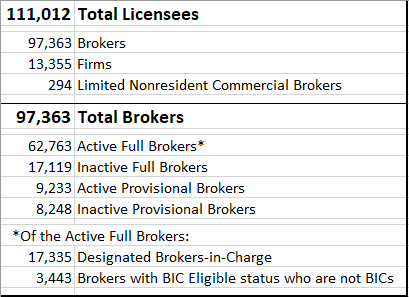Bulletin Search
Subscribe now to the Commission’s new digital Real Estate Manual
The NC Real Estate Commission now offers its Real Estate Manual in an interactive and user-friendly web-based format.
Features of the new publication include: comic strips that display brokerage activities and examples of agency relationships between brokers and clients, self-check assessments, informative graphics, keyword searches, quick access to Postlicensing course content, and a database of sample contract forms.
The web-based Real Estate Manual will be offered for a subscription fee of $25.00 per license year.
CLICK HERE to subscribe to the new web-based Real Estate Manual.
Spotlight: Leonard H. “Tony” Craver, Jr., Commission Member
Leonard H. “Tony” Craver, Jr. has served on the North Carolina Real Estate Commission since October 2013.
The owner and BIC of Craver Real Estate, LLC, in Durham, NC, Tony has been practicing real estate since 1967.
Tony served as the President of the Durham Regional Association of REALTORS® in 2005 and received the Association’s REALTOR® of the Year award in 2007. Also, he served on the North Carolina Association of REALTORS® Forms Committee for 12 years and was its Chair in 2008-2009.
Tony was elected NCAR Region Four Vice President in 2011 and 2012, and he received NCAR’s Regional Service Award in 2012.
The National Association of REALTORS® awarded Tony “REALTOR® Emeritus” status in 2008.
Tony has authored a collection of stories about building a real estate business entitled From the Ground Up- Building and Selling the American Dream.
Tony graduated from Duke University with a BA in Economics and received a varsity letter in tennis. He is married and has four children and 10 grandchildren.
Reminder: Download your Digital Pocketcard
Now that you have renewed your license, you may download your new digital Pocketcard. To do so…
- Go to www.ncrec.gov.
- Click on Licensing.
- Click on Licensee Login.
- Enter your license number and PIN (last four digits of your SSN unless you have changed it).
- Click on View/Download Digital Pocketcard.
- Click on Digital PC. (Your Pocketcard will download to your device.)
If you prefer to have a printed copy of your Pocketcard, follow steps 1-5 above and then select “Print PC.”
Click here to access your license record.
How are topics for the Update course selected?
Each year in the fall, the Commission begins its process of selecting topics for the following year’s GENUP-General Update and BICUP-Broker-in-Charge Update courses.
In October and November, the Commission builds a list of potential topics based on proposed and confirmed law and rule changes, recent complaints and disciplinary actions, suggestions from licensees and Commission Staff, and emerging business trends. Then, the Commission narrows the list, based on the most pressing issues and educational needs. The Commission finalizes and votes on the list of topics in their December meeting.
Between January and May, Commission Staff researches and develops materials based on the Commission’s directives. Student and instructor materials are created for both courses.
It’s important to note that License Law and Commission rule changes that will be effective on July 1 (of the same year) are always included in the materials.
The Update courses are ultimately delivered by approved instructors. Instructors are not permitted to teach the courses until they have attended an Update Instructor Seminar (UIS), which is a day-long “train-the-trainer” event. Commission staff offers UIS sessions in late June, so that instructors can begin delivering the courses on July 1.
Here are a few common questions that brokers ask about the Update course:
- When should I take an Update course?
Though Commission rules allow you to complete your Update course at any time between July 1 and June 10, you are strongly encouraged to take it as early as possible. That way, you will be up-to-date on law and rule changes.
- I took my Update course in the spring and all of the information was about changes during the previous year. Why is the material outdated?
The material is current for the license year in which it is written. However, it may seem outdated to some licensees if they wait to take the course until the later part of the license year or close to the continuing education deadline, because, by that time, the new laws and rules have been in effect since the previous July.
- How do I know when an Update course is being offered in my area?
A statewide CE Course Schedule is provided on the Commission’s website. To search for courses, go to the Commission’s homepage (www.ncrec.gov), click on the Education menu, and select Search CE Course Schedule. You may search for courses by course title, city, county, sponsor or instructor name, or date range.
Disciplinary Actions
MAUREEN ELLEN ANOBA (Raleigh) – By Consent, the Commission reprimanded Ms. Anoba effective June 10, 2019. The Commission found that Ms. Anoba, a broker-in-charge, failed to maintain her firm’s trust account records in compliance with Commission rules, failed to maintain a journal with a running balance, failed to include required information on ledgers, and did not perform reconciliations in a timely manner.
CHRISTOPHER BRANDON BARTON (Fort Mill, South Carolina) – The Commission accepted the permanent voluntary surrender of the broker license of Mr. Barton effective June 19, 2019. The Commission dismissed without prejudice allegations that Mr. Barton violated provisions of the Real Estate License Law and Commission rules. Mr. Barton neither admitted nor denied misconduct.
CHRISTOPHER R. BARTON (Fort Mill, South Carolina) – The Commission accepted the permanent voluntary surrender of the broker license of Mr. Barton effective June 19, 2019. The Commission dismissed without prejudice allegations that Mr. Barton violated provisions of the Real Estate License Law and Commission rules. Mr. Barton neither admitted nor denied misconduct.
CHARLOTTE HOMES & RENTALS LLC (Charlotte – By Consent, the Commission suspended the firm license of Charlotte Homes & Rentals for a period of 12 months effective June 14, 2019. The Commission then stayed the suspension for a probationary period from June 14, 2019 until June 13, 2020. The Commission found that Charlotte Homes & Rentals operated without a designated broker-in-charge from June 29, 2017, until December 11, 2018. The firm withheld earnings from an employee’s paycheck for child support payments and failed to remit these monies to the County. Charlotte Homes & Rentals initially failed to provide deposit slips, cancelled checks, property management agreements, or lease documents to the Commission’s investigator. A review of the firm’s rental trust account found that ledger sheets lacked the name of the owner and tenant, the lack of an audit trail, and deficit spending that included a shortage in the account. A review of the firm’s security deposit account found: lack of a journal, lack of a ledger, lack of an audit trail, and an overage in the account. Charlotte Homes & Rentals has worked to bring its trust accounts into compliance.
RYAN NICOLE GRAHAM (Winston-Salem) – By Consent, the Commission suspended the broker license of Ms. Graham for a period of nine months effective September 30, 2019. The Commission then stayed the suspension for a probationary period through June 30, 2020. The Commission found that Ms. Graham, acting as a buyer agent in a transaction, gave her buyer-client the code to a lock box enabling her client to access a property listed for sale by another firm without obtaining authorization from the seller. Ms. Graham received a termite report for the subject property that indicated there was “excessive water in the basement,” but failed to give her buyer-client a copy of the report or disclose its contents.
SYLVESTER HOWARD (Jacksonville) – By Consent, the Commission reprimanded Mr. Howard effective June 19, 2019. The Commission found that Mr. Howard, a qualifying broker and broker-in-charge, on or about April 17, 2018, pleaded guilty to one count of Theft of Government Property, was ordered to 12 months’ probation, and ordered to pay a fine.
JOSHUA REAL ESTATE GROUP LLC (Fort Mill, South Carolina) – The Commission accepted the permanent voluntary surrender of the firm license of Joshua Real Estate Group effective June 19, 2019. The Commission dismissed without prejudice allegations that Joshua Real Estate Group violated provisions of the Real Estate License Law and Commission rules. Joshua Real Estate Group neither admitted nor denied misconduct.
TABITHA M. KINCH (Raleigh) By Consent, the Commission reprimanded Ms. Kinch effective June 5, 2019.The Commission found that Ms. Kinch acted as a listing agent and buyer agent for a client on separate properties. Both Ms. Kinch’s agency agreements expired prior to her client closing on both properties and Ms. Kinch failed to execute new ones or sign an extension. The purchase contract for her seller clients stated that the “existing refrigerator” would convey with the property. Ms. Kinch advised her seller clients that they could substitute another refrigerator instead. After closing, however, no refrigerator remained in the property. The Commission notes that Ms. Kinch personally paid for a refrigerator to the satisfaction of the buyers.
BRYCE HOWARD SMITH (Charlotte) – By Consent, the Commission suspended the broker license of Mr. Smith for a period of 12 months effective June 14, 2019. The Commission then stayed the suspension for a probationary period from June 14, 2019 until June 13, 2020. The Commission found that Mr. Smith, a qualifying broker, allowed his firm to operate without a designated broker-in-charge from June 29, 2017, until December 11, 2018. The firm withheld earnings from an employee’s paycheck for child support payments and failed to remit these monies to the County. Mr. Smith initially failed to provide deposit slips, cancelled checks, property management agreements, or lease documents to the Commission’s investigator. A review of the firm’s rental trust account found that ledger sheets lacked the name of the owner and tenant, the lack of an audit trail, and deficit spending that included a shortage in the account. A review of the firm’s security deposit account found: lack of a journal, lack of a ledger, lack of an audit trail, and an overage in the account. Mr. Smith has worked to bring his firm’s trust accounts into compliance.
JOSHUA DON STURTZ (Fayetteville) – By Consent, the Commission reprimanded Mr. Sturtz effective June 5, 2019. The Commission found that Mr. Sturtz acted as a buyer agent for a residential property where his client requested the completion of certain repairs along with a roof certification. Mr. Sturtz received the Due Diligence Request and Agreement (“DDRA”) back from the listing agent with the roof certification crossed out and initialed by the sellers. Mr. Sturtz failed to send the DDRA to his buyer client, failed to inform his client of the certification’s removal from the DDRA, and then told his client that roof certification had been completed, when, in fact, it had not.
STEPHEN MICHAEL VOTINO, JR. (Raleigh) By Consent, the Commission reprimanded Mr. Votino effective June 10, 2019. Mr. Votino agrees that he shall be prohibited from performing property management services on behalf of others for a period of five years. The Commission found that Mr. Votino was the owner of a property management firm that was mistakenly unlicensed from 2014 until its licensure on April 19, 2018. Mr. Votino is now qualifying broker of the firm. Mr. Votino allowed an unlicensed individual to carry out day-to-day operations in the firm. The firm did not maintain its trust account records in compliance with Commission rules and did not reconcile its records timely. The firm’s trust accounts are currently in substantial compliance with Commission rules and Mr. Votino is in the process of transferring ownership of the Firm.
Staff Update

Allan R. Dameron Legal Internship Award
Logan Rigsbee (left center) and Bailey Kirby (right center) are the recipients of the 2019 Allan R. Dameron Legal Internship Award. Rigsbee is a rising second-year law student at the University of North Carolina Law School and Kirby is a rising third-year law student at Campbell University School of Law. The awards were presented by Commission Chair Anna Gregory Wagoner and Vice Chair Thomas R. Lawing, Jr. at the June Commission meeting. The award is given annually in memory of and tribute to former Commission Chair Allan R. Dameron for his dedicated service to protect the interests of consumers.

Michele L. Bennett has been employed as Accounting/Administrative Specialist in the Accounting Division. Prior to joining the Commission, she was an administrative assistant with a structural engineering firm, and was self-employed for 10 years.

Rebecca J. Holbert has been employed as Legal Case Management Paralegal in the Regulatory Affairs Division. She is a graduate of N.C. State University with a B.A. in Communication and Digital Media. She received a Paralegal certificate from Meredith College and is a North Carolina Certified Paralegal. Prior to joining the Commission, she worked as a pastry chef.

Carla Johnstone has been employed as a License Specialist in the Education and Licensing Division. Carla and her husband moved to Raleigh in 2016 from the Washington, DC area where she was an Administrative Assistant in a radiology practice.

Thomie M. Moore has been employed as a License Specialist in the Education and Licensing Division. Prior to joining the Commission, she was employed in the publishing industry.
Appearances
Marcia M. Waldron, Auditor, spoke to the Property Management Division of the Winston-Salem Regional Association of REALTORS®.
Stephen L. Fussell, Chief Consumer Protection Officer, spoke to the Winston-Salem Regional Association of REALTORS®.
Sheryl B. Graham, Consumer Protection Officer, spoke to the Greensboro Regional REALTORS® Association.
How to Access the Broker-in-Charge Login
BICs: Did you know that you can view the license records of all your affiliated brokers on one page? The Broker-in-Charge Login enables you to quickly verify whether your affiliated brokers have renewed their licenses and completed their CE and Postlicensing courses on time.
- Go to www.ncrec.gov;
- click on the Licensing menu;
- select Broker-in-Charge Login;
- enter your license number and PIN (last 4 of your SSN unless you have changed it); and
- select Licensees under my Supervision.
Disciplinary Actions
TIMOTHY GEORGE DOWD (Winston-Salem) – The Commission accepted the voluntary surrender of the broker license of Mr. Dowd effective May 22, 2019. Mr. Dowd may not reapply for five years. The Commission dismissed without prejudice allegations that Mr. Dowd violated provisions of the Real Estate License Law and Commission rules. Mr. Dowd neither admitted nor denied misconduct.
MARLIES GREEN (Fayetteville) – By Consent, the Commission permanently revoked the broker license of Ms. Green effective May 22, 2019. The Commission found that Ms. Green, qualifying broker and broker-in-charge with a management agreement for a residential property, moved into the property as a tenant. Ms. Green failed to pay rent in a timely manner to the owner, caused extensive damage to the premises, and was eventually evicted. Ms. Green failed to return deposits to the property owner. Ms. Green failed to remit rental proceeds to other owner clients, failed to pay vendors for work performed on properties managed by her firm, and failed to return a tenant security deposit to a tenant within thirty days of lease termination. When Ms. Green finally did remit the deposit to the tenant, the bank returned the check due to insufficient funds. The tenant has still not received the deposit. Ms. Green has refused to communicate with property owners, vendors, tenants, and Commission staff and failed to update Commission records with her new address and that of the firm.
PAUL ROBERT JONES (Wilmington) – By Consent, the Commission suspended the broker license of Mr. Jones for a period of 26 months effective May 9, 2019. The Commission then stayed the suspension for a probationary period from May 9, 2019 through July 9, 2021. The Commission found that Mr. Jones timely reported his July 9, 2018, conviction for felonious Possession With Intent to Sell and Deliver a schedule VI controlled substance. Mr. Jones was sentenced to 6-17 months of imprisonment, which was suspended for a 36-month period of supervised probation. Mr. Jones may be transferred to unsupervised probation for the last six months if he remains in compliance with probation.
DEBRA THOMAS PARSONS (Rockingham) – By Consent, the Commission reprimanded Ms. Parsons effective May 22, 2019. The Commission found that Ms. Parsons, broker-in-charge and qualifying broker, reported that a former bookkeeper had embezzled funds from her property management firms. The employee was a licensed broker who later surrendered her real estate license to the Commission and signed a Confession of Judgment in District Court. The majority of funds embezzled belonged to Ms. Parson’s firms although some were funds held in trust for others. An initial review of Ms. Parson’s trust accounts found that the firm did not perform three-way monthly reconciliations and left unreconciled deposits dating back years on the books. Since the audit, Ms. Parsons has brought the firm’s trust accounts into compliance with Commission rules. The Commission notes that Ms. Parsons and her staff have taken the Commission’s Basic Trust Account course and hired a vendor to assist with the management software.
PREFERRED PROPERTIES OF NC LLC (Rockingham) – By Consent, the Commission reprimanded Preferred Properties of NC effective May 22, 2019. The Commission found that the broker-in-charge and qualifying broker of Preferred Properties of NC reported that a former bookkeeper had embezzled funds from the firm’s trust accounts. The employee was a licensed broker who later surrendered her real estate license to the Commission and signed a Confession of Judgment in District Court. The majority of the funds embezzled belonged to the firm although some were funds held in trust for others. An initial review of the firm’s trust accounts found that did not perform three-way monthly reconciliations and left unreconciled deposits dating back years on the books. Since the audit, the firm has brought its trust accounts into compliance with Commission rules. The Commission notes that firm’s staff has taken the Commission’s Basic Trust Account course and the firm has hired a vendor to assist with the management software.
PREFERRED RENTALS OF NC LLC (Rockingham) – By Consent, the Commission reprimanded Preferred Rentals of NC effective May 22, 2019. The Commission found that the broker-in-charge and qualifying broker of Preferred Rentals of NC reported that a former bookkeeper had embezzled funds from the firm’s trust accounts. The employee was a licensed broker who later surrendered her real estate license to the Commission and signed a Confession of Judgment in District Court. The majority of the funds embezzled belonged to the firm although some were funds held in trust for others. An initial review of the firm’s trust accounts found that the firm did not perform three-way monthly reconciliations and left unreconciled deposits dating back years on the books. Since the audit, the firm has brought its trust accounts into compliance with Commission rules. The Commission notes that firm’s staff has taken the Commission’s Basic Trust Account course and the firm has hired a vendor to assist with the management software.
QUALITY HOMES PROPERTY MANAGEMENT LLC (Fayetteville) – By Consent, the Commission permanently revoked the firm license of Quality Homes Property Management effective May 22, 2019. The Commission found that its qualifying broker and broker-in-charge had a management agreement for a residential property, moved into the property as a tenant, failed to make timely rent payments to the owner, and caused extensive damage to the premises. The owner evicted the broker who also failed to return deposits to the property owner. The firm failed to remit rental proceeds to other owners and failed to pay vendors for work performed on properties the firm managed. The firm also failed to return a tenant security deposit to a tenant within thirty days of lease termination. When the firm issued a check to the tenant, the bank returned the check due to insufficient funds. The tenant has still not received the deposit. The firm has refused to communicate with property owners, vendors, tenants, and Commission staff and failed to update Commission address records for the broker and firm.
MARK JOSEPH VOLAK (Mooresville) – By Consent, the Commission suspended the broker license of Mr. Volak for a period of one year effective December 1, 2018. Six months of the suspension were active with the remainder stayed for a probationary period from June 1, 2019 to December 1, 2020. The Commission also ordered that Mr. Volak shall be ineligible to act as a Broker-in-Charge until November 1, 2023. The Commission found that Mr. Volak, who held a contractor’s license in addition to a broker license, contracted in December 2014 to build a home for a client but failed to complete construction of the project, leaving materials and a rented dumpster on the site. As a result, liens were filed by various vendors against his client for more than $65,000 despite Mr. Volak’s having collected more than $182,000 in draws and other payments. Mr. Volak permanently surrendered the broker license of his construction firm in a 2016 disciplinary action based on a prior construction project. Mr. Volak continued to pay vendors after termination of the construction contract in the present complaint.
RULEMAKING APPROVED
The Commission’s current rulemaking session is now complete. The Rules Review Commission approved 11 rules, 7 amendments and 4 readoptions, at its May 16, 2019, meeting. Text of the approved rules may be found on the Commission’s website under ‘License Law and Rule Changes.’ Changes to the rules are reflected by underlining text that will be added and striking through text that will be deleted. The rules have an effective date of July 1, 2019, except for 21 NCAC 58A .1902, which has an effective date of July 1, 2020. Each effective date is noted in the history of each rule.
If you would like to receive notifications of rulemaking proceedings, please visit www.ncrec.gov/home/subscribe.

